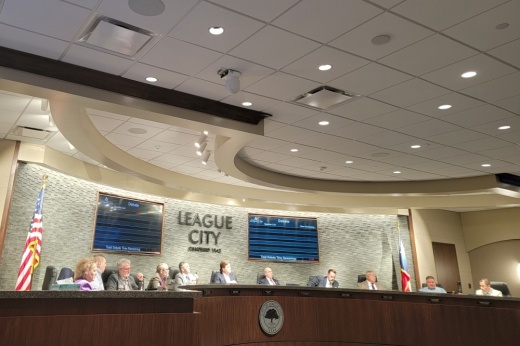The gist
On April 25, League City City Council voted unanimously to remove specific drainage improvement projects in the subdivisions from the voter-approved 2019 general obligation bond and the city’s fiscal year 2024-28 capital improvement plan, according to agenda documents.
In May 2019, voters approved a $145 million bond allocating $73 million for 21 drainage projects, including the aforementioned projects.
Council also voted unanimously to remove the same improvement projects from The North League City Drainage Improvement Projects plan, which, according to agenda documents, originally proposed installing the following:
- Four overflow swales in the Brittany Bay subdivision
- 13 overflow swales within the Newport and Ellis Landing subdivision
- Eight overflow swales in The Landing subdivision
- Drainage expansion along Main Street and Wesley Drive
In their own words
Some residents of the neighborhoods in question expressed confusion about the decision to nix the drainage improvement projects.
They asked the city to clarify its reasoning for removing the projects, especially in areas previously hit during Hurricane Harvey.
“The problem with canceling this is that the northwest corner of Brittany Bay flooded terribly during Harvey,” Brittany Bay Subdivision resident Chuck DiFalco said. “I could tell about 40-something houses had water in them.”
When the city included neighborhood drainage improvements in the original project scope, it aimed to prevent flooding by adding swales to absorb water during floods, City Manager John Baumgartner said. However, the city was met with resistance from homeowners near the proposed swale sites.
City staff met with those homeowners and the homeowners association boards but did not specifically meet with homeowners who had experienced flooding—a move that left some on council concerned the city had not done its due diligence in capturing resident feedback holistically.
“We can’t default our duty to the citizens to the HOA,” council member Chad Tressler said.
Because the homeowners expressed opposition, the city would have to obtain the land via eminent domain to move forward with the project, Long said—a decision he didn’t think City Council would support.
“While it may be unfortunate that some neighbors don’t value it and want to keep their land the way it is, we’re not going to eminent domain the land to force the project down the neighborhood’s throat,” Mayor Nick Long said.
What’s next
While the city is canceling the originally scoped drainage projects, it will conduct a study to identify alternative ways to mitigate flooding in the area, Long said.





